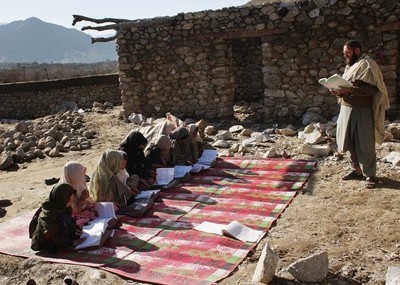Deborah Haynes, Defence Correspondent
Millions of pounds in taxpayers’ money have been wasted on failed reconstruction projects in Afghanistan, according to an internal assessment by the Department for International Development.

February 16, 2009: Afghan girls attend a rural school in open area in the village of Sandarwa in eastern Afghanistan. (Photo: Getty Images)
An evaluation by independent consultants criticised the department’s approach to planning, risk management and staffing, and said poor co-ordination with the rest of Whitehall meant that the department was slow to shift strategy as the military effort moved to counter-insurgency.
The report reveals that in 2006-07, more than half of the department’s large projects, in which millions of pounds were invested, were deemed likely to fail, excluding money put into a fund run by the World Bank. Only a quarter of state building projects were rated successful in 2006, with 4.5 per cent of them rated value for money.
Among the failed projects singled out in the Country Programme Evaluation is the Afghanistan Stabilisation Fund, designed to “establish basic security and good governance in the district and provinces of Afghanistan”. This was begun in 2004 with a £20 million payment to the Afghan Government but ended three years later with “little evidence of tangible benefit”.
The department’s own review in 2005 warned of “potentially catastrophic consequences” if weaknesses in the programme were not corrected. Beset by poor planning, a lack of transparency and failed delivery, it was abandoned in March 2007. Only 639 people received training. Commentators criticised the “disastrous” project.
In another programme in Helmand, the department paid for 300 wells to be dug in an area prone to drought, without carrying out a geological survey. Some of the wells have since run dry as the water table retreated. The report finds that the department’s risk assessment ignored the absence of the rule of law and corruption in the region.
A survey of Afghan opinion in Helmand found local residents complaining about poor construction, a lack of monitoring and unhappiness with the role of interpreters, while the department rated its own projects there a success. It took until late 2007 for the department to recruit a conflict adviser even though British troops started operating in Helmand in 2006.
Staffing levels in Kabul were described as “wholly unrealistic”. Until 2006 the development department attempted to run its programmes with only six non-Afghan staff in Kabul.
The report says: “An inappropriate level of staffing for the ambitious scale of the Afghanistan programme is a key theme that underpins many of the findings of this evaluation.”
Andrew Mitchell, Tory spokesman for international development, said the report “paints a worrying picture of failing projects, misallocation of staff and crossWhitehall wrangling”.
The department said it looked only at operations up to 2007 and did not “reflect the significant progress and developments made since that time”. It added: “This report informed the new Afghanistan development plan that was subsequently agreed as part of a wider UK Government strategy. This strategy delivers more staff on the ground, better project assessment and closer co-ordination with the Afghanistan Government.”
It added: “The reality is that delivering aid in a conflict-affected state like Afghanistan is extremely difficult.”
Some projects were a success, including a £20 million initiative to give small loans to the poor and an £18 million programme to build and repair roads, schools and clinics. By 2007 the department’s portfolio in Afghanistan contained 58 projects with a value of about £520 million, including £317 million for the Afghanistan Reconstruction Trust Fund, administered by the World Bank.
Aid and development projects have enabled six million more children to attend school compared with 2001, a 70 per cent increase in access to healthcare and an extra 35,000 lives saved every year, the department said.



